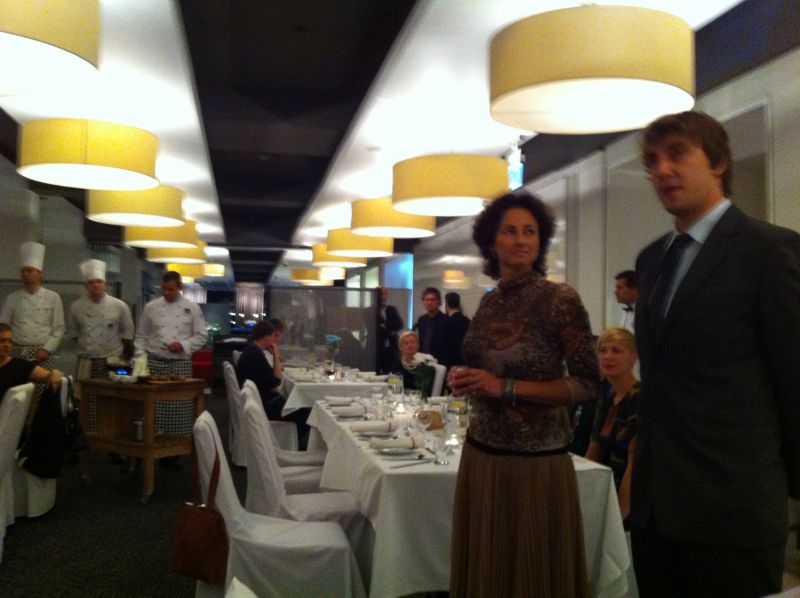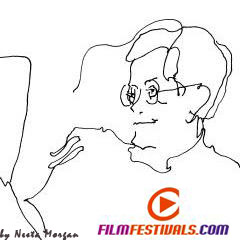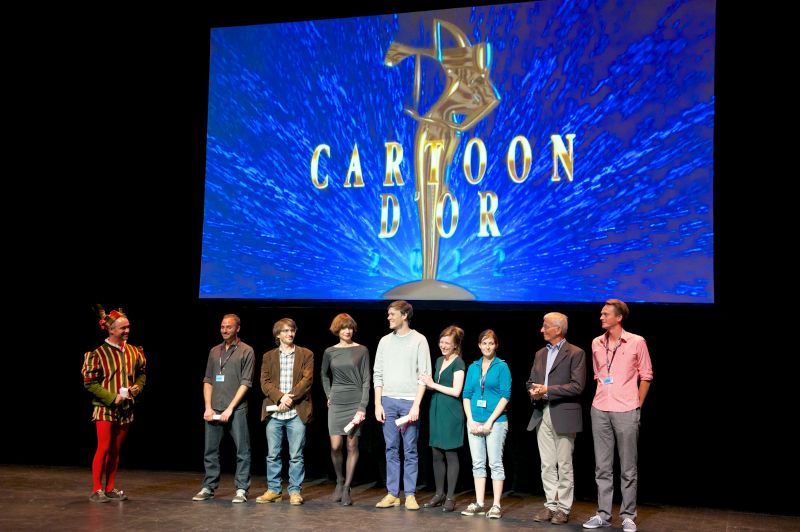The Tribeca Film Festival has rapidly evolved since its founding in 2002 into the biggest U.S. film festival. In 2006 the Tribeca fest lasted thirteen days and served 465 thousand individuals including 203 thousand who purchased tickets for film screenings and panels. About 4200 productions were submitted coming close to the 4350 entered for the different Berlinale sections (excluding market films). Tribeca has retained its successful eclectic programming approach ranging this year from Hollywood market oriented movies like POSEIDON and UNITED 93 to thought provoking films like THE FREE WILL and LAND OF THE BLIND. The fest also screened critical and innovative documentaries such the WAR TAPES, DEAR FATHER QUIET WE ARE SHOOTING and MAQUILAPOLIS. Unlike other US film festivals the Tribeca emphasizes reaching the local community orientation as reflected in numerous events arranged for families and festival sections devoted to just to New York City productions. Unimpressed by the exclusivity of Telluride or the New York Film Festival, Peter Scarlet has provided Tribeca with a cosmopolitan and inclusive orientation sensitive to both the film arts and the audience. This task is facilitated by Tribeca and its film institute having a solid funding basis due to large private (specifically American Express) and public (Lower Manhattan Development Corporation) support . Peter Scarlet has been the executive director of the Tribeca Film Festival since 2002. He served before as the head of the Paris based Cinemateque Francaise and helmed the San Francisco International Film Festival from 1983 – 2001.
Interview with Peter Scarlet May 16, 2006
CM: Over the last five years has it happened less frequently that people say that they prefer Cannes or Sundance. Thus is Tribeca getting more established?
PS: Again there are other factors you have to keep in mind. If the film is finished in October and can be submitted to Sundance, the producer will probably want to send it to Sundance. Why keep it on the shelf for five months longer. But we are speaking of American films now. Filmmakers overseas recognize more and more that this is a better place and better showcase than Sundance for foreign films. Put differently would you rather have your Bulgarian movie shown in Park City, Utah or in New York?
CM: What are your personal criteria of success for the Tribeca Film Festival?
PS: My own criteria are probably are not that different from those of the average spectator. If the films moves me; , it makes me love; it makes me cry or perhaps makes me look at the world a little bit differently. My criteria may be somewhat different from the average spectator in that I have seen an awful lot of films and I tend to see more and more films that are like the ones I have seen before five or ten years ago. That relates to another difficulty which is facing festival directors and programmers everywhere, now that we have entered the area of what Alexandre Astruc called “the camera stylo”. Anybody can make a movie. Sometimes there are happy surprises, but there is an enormous growing amount of crap being turned out, or crap that is being made by people who think this is the way to make a Hollywood movie and that they are going to show that they can do that.
CM: Do you sense that this explosion of new production technologies has led to an increase of good movies.
PS: No, not at all. Every year there is a film like WAR TAPES which was possible through the new technologies and makes the rest of it worthwhile. On the other hand we are the people which have to slug through it all.
CM: Are there specific criteria that the Tribeca selection committees apply?
PS We do not strictly speak of selection committees; I make the selections with Nancy Schafer and David Kwok focusing on the New York films and some of the American films.
Our policy is generally if somebody really likes the film and is ready to go to war for it we will probably show it. We also have program consultants all over the world who look at things and winnow through stuff and advise us. But we do not have selection committees voting for [the inclusion of] a film.
CM: What is the role of private sector / corporate funds in the total festival?
PS: We probably have a larger proportion of corporate funds here because this festival does not have a non-profit status. The Tribeca Film Institute is non-profit. We have very generous corporate support which has not affected our programming a bit. We have a complete belief in the separation of church and state and there is probably no stronger example than the fact that we showed this year the film WHO KILLED THE ELECTRIC CAR? that points a finger in a strong way at General Motors. And General Motors is one of our sponsors.
CM: Tribeca is one of the few major film festival initiated and sustained by established film directors like Scorsese and De Niro. How does that impact your work as the festival director?
PS: Our work is affected in one important way. Until now with some rare exceptions, the majors have not wanted to put their films into American film festivals. Because of Mr. De Niro and Mr. Scorsese’s presence here and because of changes in the release patterns- like New York is a place where to open a film, we have been able to show films by Gerhard Frye and Poseidon. That has ruffled, of course, the feathers of alarmists who said, “What are films like that doing in a film festival?” That is perfectly fine for films like that since they attract an audience who might not pay attention to the film festival otherwise. And I believe thst they would stick around and from time to time see another film. And that is exactly the model that Cannes, Berlin, and Venice have always had where American majors played a big part of their festivals.
CM: Compared to other US festivals such as Sundance, Telluride and the New York Film Festiva, l what is unique about Tribeca?
PS: It is not for me to answer that. Better answered by people who come here. It is like apples and oranges. Four days in the Rocky Mountains. That you spent $2500 to go there or to go to Telluride or Park City versus going to New York
CM: Do you have any experience in film making?
PS: I have experience in just about everything… I worked in film making in the independent scene in New York in the 1960-s. In California I worked as a teacher covering film, film history, and film theory. Thus, relating to film festivals, it might be a way for people to learn better than in the classroom, because their minds not tight with that paralyzing question what is going to be on the final exam. And because it is not branded as education it is branded as fun rand diversion. But I am very much a believer that the diversion and entertainment should not be empty.
CM: If there were sufficient funding and you had a free hand, what are the changes/additions you would introduce at the Tribeca Film Festival?
PS: I would like to bring more people. At the moment our budget permits us to invite the director for every film. But I am an anti-auteurist to the degree that I believe the producers play a part too and the cast as well. What was great this year is that the crew and cast for the Brazilian and Egyptian films flew in on their own. The social element of the film festival is very important, not necessarily the parties, but a chance for the people to meet and talk,
and that is really rare. As filmmakers will tell you when they go to Cannes or to Toronto they are there with their films for three days. They show their films to the press conference, they go home, and they do not see anything. Filmmakers come here to see films and meet other film makers, and that is rarer than you would think.
CM: That is certainly borne out by interviews I had here several years ago with filmmakers at Tribeca. They preferred the relaxed ambiance Tribeca offered to the hectic business driven hustle of Sundance. In that context do you consider having a film market at Tribeca?
PS: We may well. In fact we had a number of world premieres this year. We front-loaded them all and we had screenings of them all in the beginning of the festival so they buyers could come. Whether we will eventually have a market, I am not yet convinced that it is necessary, there is the European Film Market in Berlin, there is a market in Hong Kong, and others. But we are certainly exploring it. New York is a marketing town. But still my main interest is that the social level, that the convivial level always be maintained. Again I am not into knocking Sundance, but it is probably indicative of my own taste that I have not been to Sundance since the first Gulf War and [that] I do not go to Cannes. I often use the excuse now for people who say “see you at Cannes” that I won’t go since I would be the guy snoring in the seat next to them since it takes a while to recover from the fun.
CM: Sounds familiar since among journalist the Berlinale is considered a place to work and Cannes a place to party. The Berlinale also offers each year new components be it Talent Campus, the expanding European Film Market, or the co-production conference.. since they have Kosslick [helming the Berlinale] and are as well funded as Tribeca is.
PS: Yes they do great things. What I envy the most is that they have the Sony and Cinemaxx venues. The other things we would like to do more of at Tribeca if we had the time and money, is the idea exemplified by the film ONCE UPON A TIME IN MARRAKECH. Bringing together young film students from New York with film students from Morocco, and including Martin Scorsese on the one had and Abbas Kiarestami on the other was the element that made it interesting to me. It was not just New York - Morocco but having someone come in from the third culture with that vantage point.
CM: Following up on your comment, do you consider setting up a Talent Campus, a possibility that was discussed [by CM] with the Film Commissioner of New York? You seem to be doing something similar in your Tribeca All Access projects, though it is restricted to local talents.
PS: I think it is worth exploring
CM Thank you,
Claus Mueller
New York Correspondent
filmexchange@gmail.com
 Chatelin Bruno
Chatelin Bruno 






















